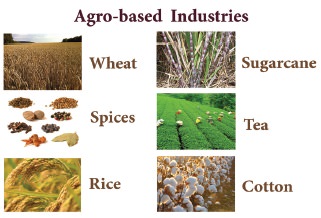Economics - Rural Industries | 11th Economics : Chapter 10 : Rural Economics
Chapter: 11th Economics : Chapter 10 : Rural Economics
Rural Industries
Rural
Industries
Rural
industries embrace all industries which are run by rural people in rural areas.
These industries are based primarily on the utilization of locally available
raw materials, skills and small amount of capital. The rural industries can be
broadly classified into a) cottage industries, b) village industries, c) small
industries, d) tiny industries and e) agro-based industries. Cottage Industries: Cottage industries
are generally associated with agriculture and provide both part-time and full-time jobs in rural areas.
The
important characteristics of this type of industries are as follows:
1.
These industries are carried out by artisans in
their own homes at their own risk and for their own benefit. Artisans may
combine this work with another regular job.
2.
No or little outside labour is employed. Normally,
the members of the household provide the necessary labour.
3.
These industries are generally hereditary and
traditional in character.
4.
No or little power is used.
5.
These industries usually serve the local market and
generally work on the orders placed by other industries.
Examples
of cottage industries are mat, coir and basket making industries. The principal
cottage industries of India are hand-loom weaving (cotton, silk, jute, etc.)
pottery, washing soap making, conch shell, handmade paper, horn button,
mother-of-pearl button, cutlery, lock and key making industries.
Village Industries: Village
industries are traditional in nature and depend on local raw-material. They cater to the needs of local population.
Examples of village industries are gur and khandsari, cane and bamboo basket,
shoe making, pottery and leather tanning. These are almost similar to the
cottage industries.
Small Scale Industries (SSIs): Most
small scale industries are located near urban centres. They produce goods for local as well as foreign markets.
Examples of such small scale industries are manufacture of sports goods, soaps,
electric fans, foot wear, sewing machines and handloom weaving.
SSIs are also known as Micro, Small & Medium Enterprises (MSMEs). They are defined and categorized by the Micro, Small & Medium Enterprises Development Act, 2006. The Act categorizes different scale of industries on the basis of investment in plant and machinery in case of manufacturing industries and on the basis of investment in equipment in case of service sector industries.

Agro-based Industries: These
industries are based on the processing of agricultural produce. Agro- based industries may be organised on a
cottage-scale, small-scale and large-scale. These industries tend to develop
household settlements around them as they employ more labour on a regular
basis. Examples are textile, sugar, paper, vegetable oil, tea and coffee
industries.
Related Topics